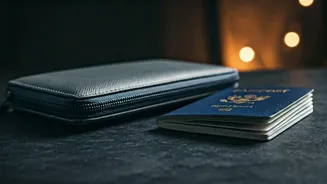Never Do This!
One of the most crucial points is to protect your passport from damage, which includes avoiding common pitfalls like folding or bending it. Physical damage could
make your passport unusable. Similarly, using staples or placing stickers on the pages could be problematic. Keep your passport in a secure, dry place, far from exposure to direct sunlight or moisture. Avoid leaving your passport in a hot car. Any physical alterations or damage can invalidate it, potentially leading to travel complications at immigration. It is your responsibility to safeguard this vital document. Keep it in a place where it won't be exposed to unnecessary risks and keep its appearance pristine so that you have no trouble when traveling internationally.
Copy, But Don’t Show
It's smart to have a copy of your passport, but it's important to keep the original safe. While a photocopy can be helpful for identification if your passport is lost or stolen, it should not be treated as a replacement. Keep the copy separate from your actual passport, such as a secure cloud storage or a trusted family member. Do not display your passport to anyone unless they are an authority or are verifying your identity for official purposes. The copy might be useful if you're asked to provide ID while abroad. However, your actual passport should be guarded and used only when absolutely necessary, such as when you’re boarding your flight or when you are required to have it to enter the country.
No Unauthorized Alterations
Refrain from making any alterations to your passport. This rule extends to writing on the document, even seemingly harmless notes or doodles. These kinds of alterations can invalidate the passport. Any changes that are not made by an authorized official are considered tampering. Such actions can cause serious issues, including delays at border control and travel complications. Should you need to change any details, contact the issuing authority to start the official process and get a new one. This includes updating information such as name changes or address changes. Your passport is a legal document, and keeping it intact will help ensure that your travels go smoothly.
Passport Storage Secrets
It is crucial to be careful about where and how you store your passport. Avoid leaving it unattended, especially in public spaces like hotel rooms or in luggage in transport. Secure locations include hotel safes and hidden pockets in clothing. You should also consider using a passport holder to keep it safe from environmental damage and theft. If you're carrying it, keep it close to your person, such as in a money belt or a secure pocket. Never leave it lying around, and be mindful of your surroundings. Proper storage protects your passport, prevents theft, and secures your travel plans. Having a safe location for your passport will enable you to focus on the pleasure of your international trips.
Never Lend It Out
Do not lend your passport to anyone, regardless of the situation. Your passport is a personal document, and letting someone else use it is illegal and risky. Giving access to it puts you at risk of identity theft. Your passport is a crucial identity document, and it shouldn't be given to anyone for their own personal use or be used on your behalf by another person. If you allow it to get into the wrong hands, it may be used for illegal activities. It is your responsibility to maintain control of your passport and never lend it to another person. Always keep it in your possession and be aware of its whereabouts.
Respect The Pages
Avoid damaging the pages of your passport. Any tear or disfigurement of pages can cause a delay or a denial of entry. Do not remove or alter pages in your passport. If any pages are missing, the document is considered compromised, and it should not be used for travel. Keep your passport away from liquids to prevent it from getting wet and causing damage. To avoid accidental damage, keep it in a protective cover. The passport's pages contain essential information and security features; their safety is crucial for it to be useful. If your passport does get damaged, immediately contact the appropriate authorities to obtain a new one to avoid trouble during your travel.
Know Your Expiration
Check your passport's expiration date well ahead of your planned travels. Many countries require your passport to be valid for at least six months after your planned return date. This requirement can vary depending on your destination, so verify specific requirements before booking your travel. Renew your passport well in advance of its expiration to avoid delays or issues at immigration. If your passport is nearing its expiration date, renew it as early as possible. It is much better to begin the renewal process as soon as you find out that your passport will expire soon. The renewal process can take weeks or even months, so early planning is essential. Verify that you have ample time for the renewal process to avoid possible travel complications.
Report It Immediately
If your passport is lost or stolen, report it immediately to the local authorities and your country’s embassy or consulate. Delaying the report could lead to misuse of your passport. The embassy can help in issuing a replacement and assisting with any travel complications. By reporting it quickly, you will prevent unauthorized use and potentially prevent identity theft or other illegal activities. Contact your embassy, as they will guide you through the process of filing a police report and applying for a replacement passport. Prompt reporting helps protect you and ensures that you can continue your trip or return home without issues. Early reporting can help safeguard against fraud.














